Delhi, the vibrant and bustling capital city of India, is not only known for its rich cultural heritage and diverse traditions, but also for its beautiful and diverse avian fauna.
Home to a wide range of bird species, from the common sparrows and pigeons to the rare migratory birds, Delhi is an ornithologist’s delight. The city boasts a variety of habitats, including parks, wetlands, forests, and gardens, which are perfect for bird-watching and bird photography.
With its unique confluence of urbanization and nature, Delhi offers a fascinating glimpse into the world of birds and their magical habitats. This article will offer an overview of the diverse bird species found in Delhi, their habitat, and their ecological significance.
1. Rock Dove
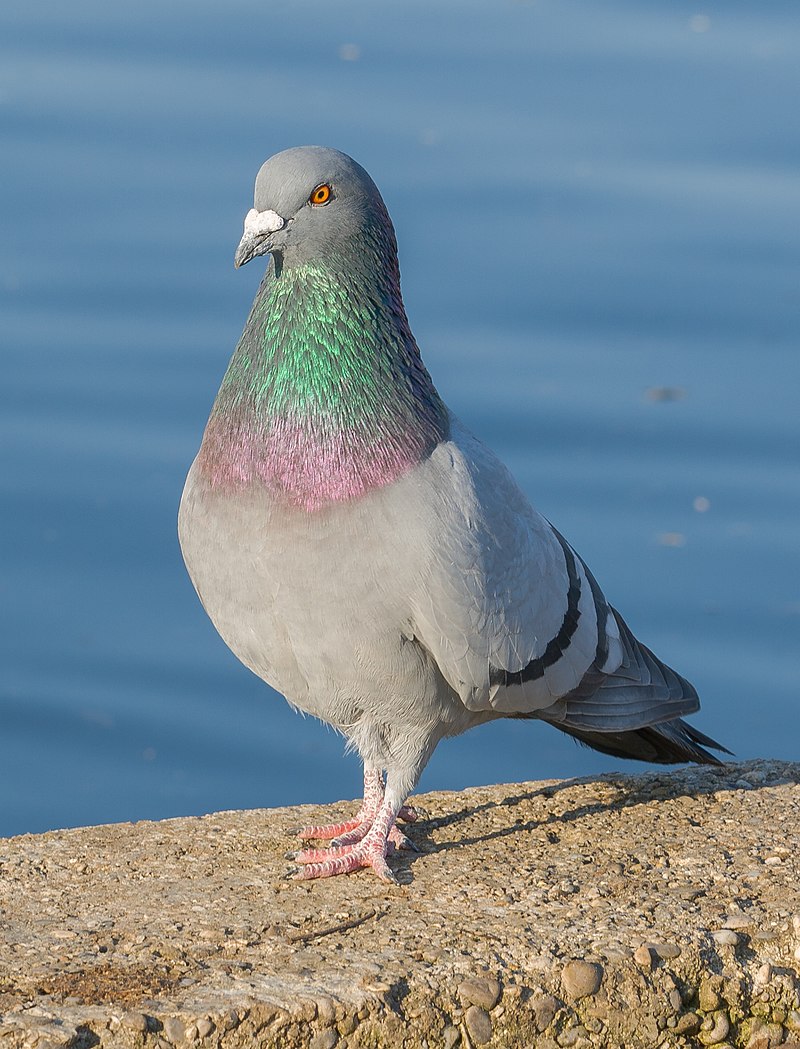
Rock dove, also known as Rock Pigeon or Common Pigeon, is a member of the bird family Columbidae.
It is considered to be an important creature worldwide due to its domestication by humans centuries ago; resulting in the modern-day Domestic pigeon which descends from this species.
Its population has increased over time because some domestic pigeons have escaped captivity and joined wild populations.
The rock dove can most easily be identified by its prominent blue-grey feathers with darker bars on wings and tail along with two black bands on each wing.
They are typically found in large flocks near cliffs or buildings but may also inhabit rural habitats such as open fields and meadows if there’s enough food available for them nearby.
Although they don’t migrate far distances like other birds, their numbers increase significantly during winter months.
When more food sources become available closeby so that they won’t need to travel too far away from home base for nourishment.
Scientific classification:
| Kingdom | Animalia |
| Phylum | Chordata |
| Class | Aves |
| Order | Columbiformes |
| Family | Columbidae |
| Genus | Columba |
| Species | C. livia |
Also Featured In: Common Birds in India, Italian Birds You Should Know
2. Painted Stork
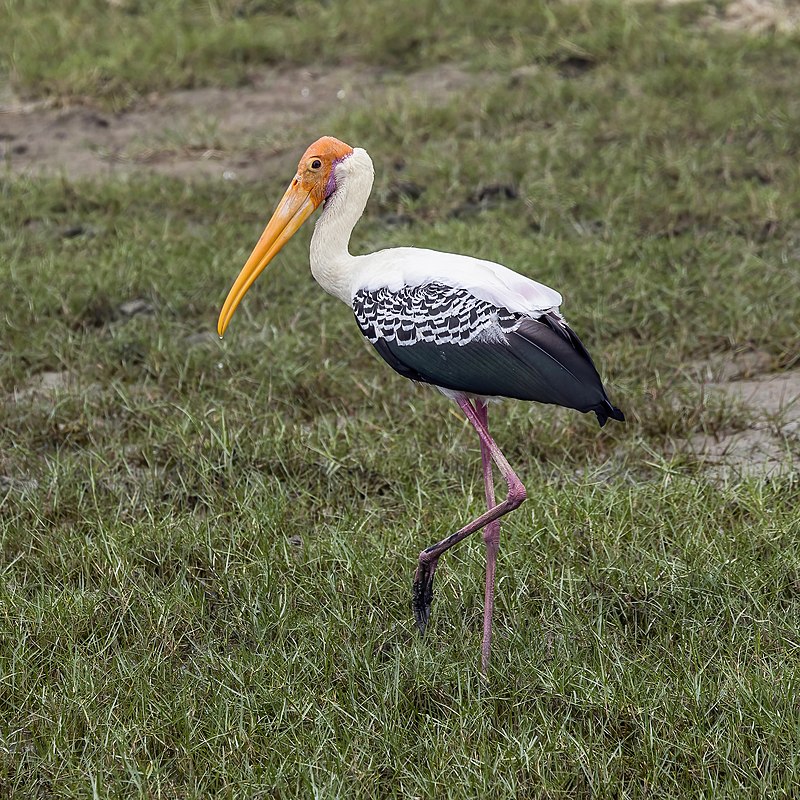
The Painted Stork is a large bird that belongs to the stork family. It has an impressive wingspan and can be found in tropical Asia, ranging from the Indian subcontinent all the way to Southeast Asia.
These birds are unique because of their pink tertial feathers, which gives them their name. They form flocks when they forage in shallow waters near rivers or lakes.
They dip their half-open beaks into water looking for food such as fish, frogs and other small aquatic creatures.
A distinctive feature of these birds is that during breeding season both males and females have red eyes with yellow rings around them.
This species also displays amazing cooperative behaviour when nesting; young storks help build nests by bringing material back to older ones who weave it together forming huge colonies on trees close to wetlands.
Scientific classification:
| Kingdom | Animalia |
| Phylum | Chordata |
| Class | Aves |
| Order | Ciconiiformes |
| Family | Ciconiidae |
| Genus | Mycteria |
| Species | M. leucocephala |
Also Featured In: Common Birds of Maharashtra, Big Birds that Live in Singapore
3. Asian Koel
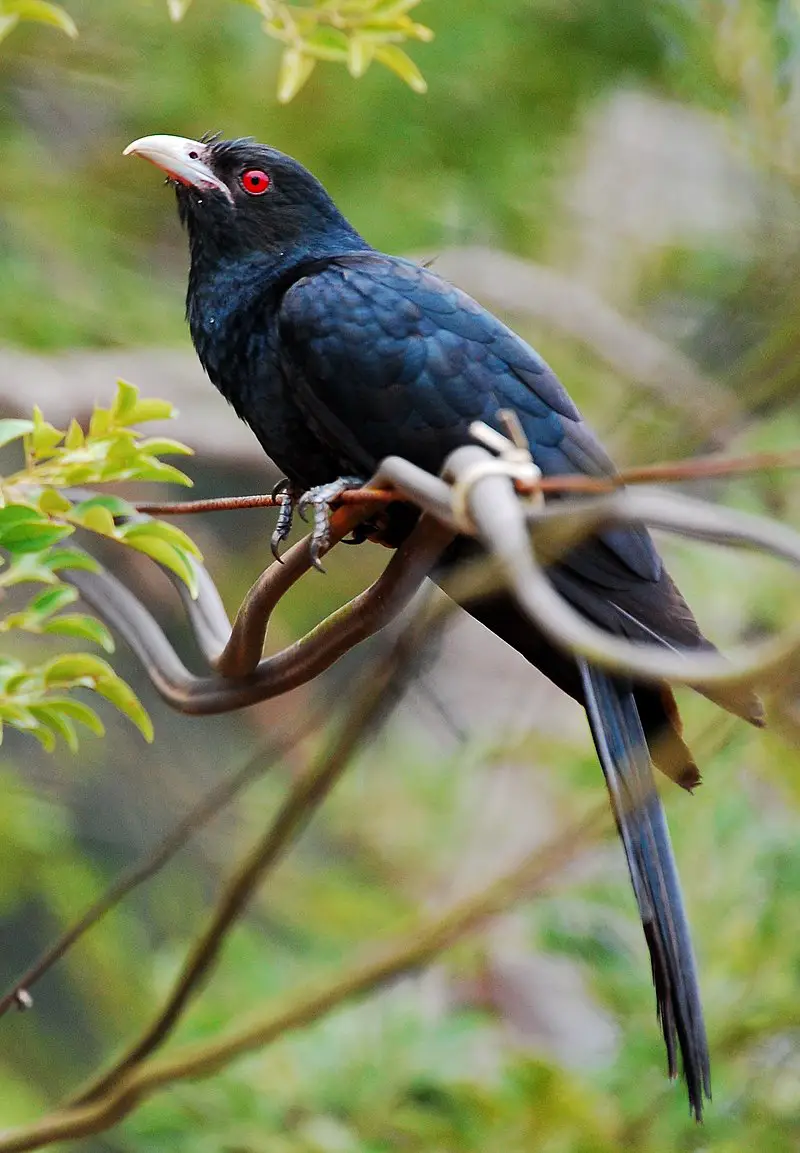
The Asian koel is a member of the Cuculiformes family, found in India, China and Southeast Asia. It shares its range with two closely related species – black-billed koels and Pacific koels.
This bird exhibits brood parasitism; it lays its eggs in nests of other birds, who then unknowingly become foster parents to their young.
Characterised by long tails and glossy feathers that vary from deep blue to greenish-black depending on region, these birds are known for their loud call which can be heard during both day or night time.
They feed mainly on fruits but also take insects when available.
All in all, the Asian Koel is an interesting species that has adapted itself well over many centuries within different ecosystems across Asia.
Scientific classification:
| Kingdom | Animalia |
| Phylum | Chordata |
| Class | Aves |
| Order | Cuculiformes |
| Family | Cuculidae |
| Genus | Eudynamys |
| Species | E. scolopaceus |
Also Featured In: Hong Kong Birds You Need to See, Birds of Konkan
4. White-Throated Kingfisher
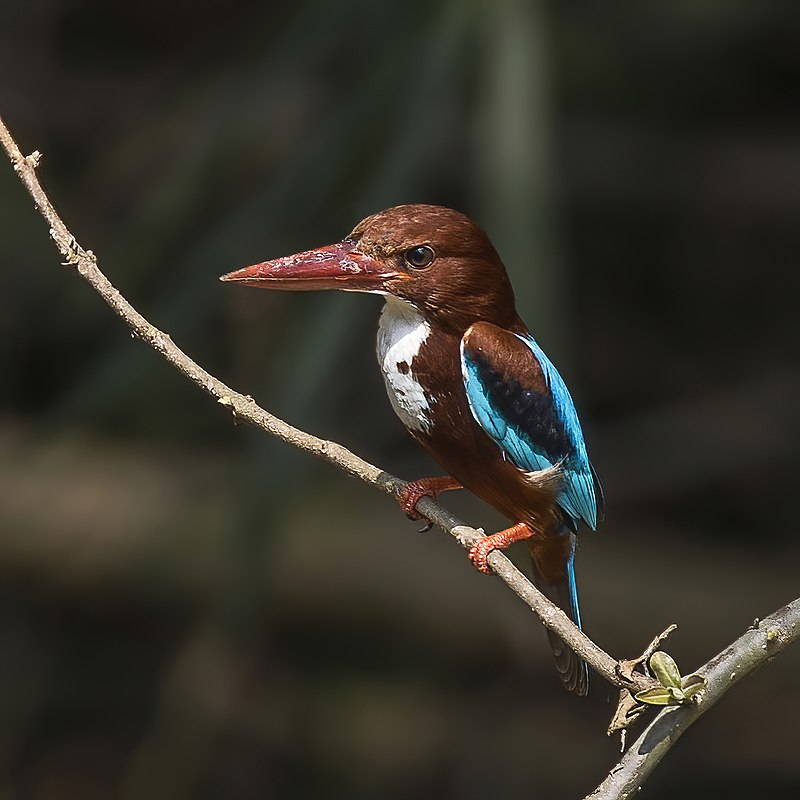
The White-throated Kingfisher is a beautiful bird with bright colors and distinct features. Its back, wings and tail are a deep blue while the head, breast, throat and belly are white.
It has two black stripes across its eyes which contrast nicely against its orange beak and feet.
These birds can often be found perching on tree branches or hovering over creeks in search of food like fish or small insects such as grasshoppers or crickets.
They use their sharp bill to pluck prey from water surfaces then swallow them whole after making adjustments for size by beating it against rocks if necessary.
The White-throated Kingfisher breeds during monsoon season when rainfall increases levels in rivers leading to an abundance of aquatic life that these birds love so much.
Scientific classification:
| Kingdom | Animalia |
| Phylum | Chordata |
| Class | Aves |
| Order | Coraciiformes |
| Family | Alcedinidae |
| Subfamily | Halcyoninae |
| Genus | Halcyon |
| Species | H. smyrnensis |
Also Featured In: Turkey Birds You Should Know, Lebanon Birds Live in Semi-Desert Areas
5. Black Kite
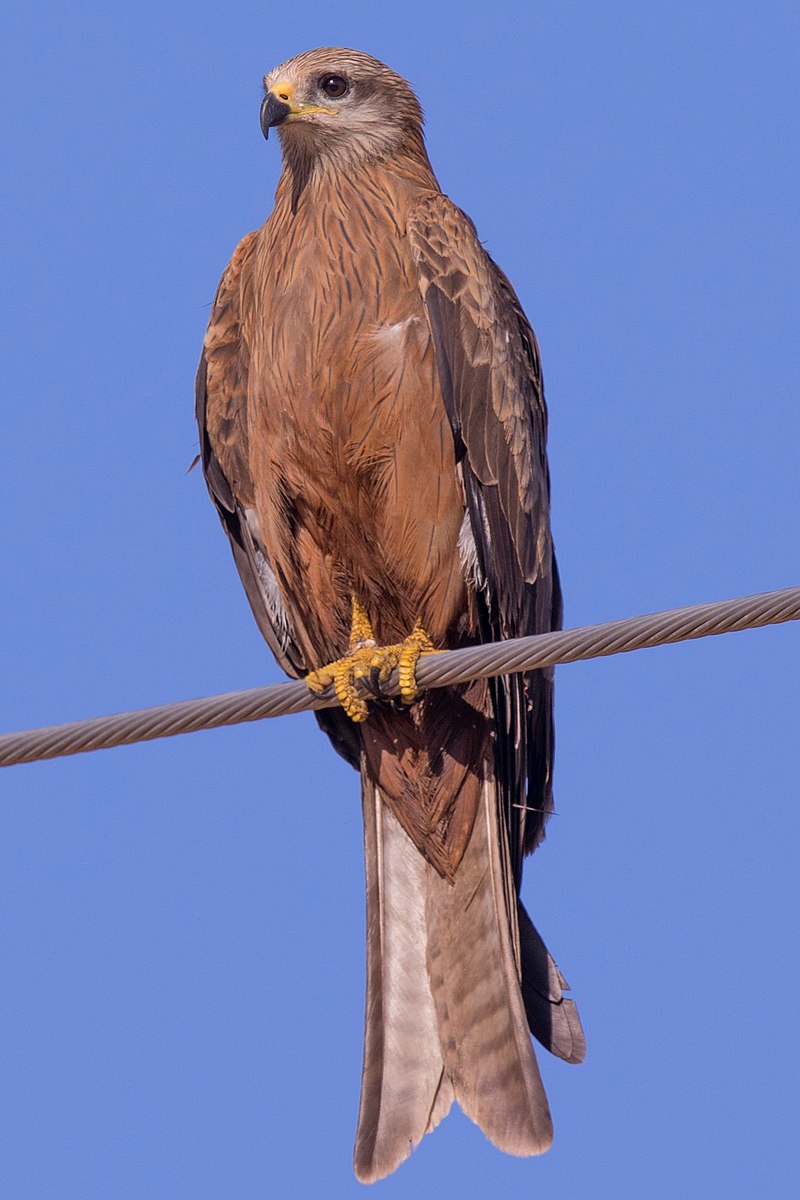
The black kite is one of the most abundant species of diurnal birds of prey in the world, with a global population estimated to be up to 6 million individuals.
It belongs to the family Accipitridae and has medium-sized body size. The wingspan can range from 150 cm – 180cm wide.
They have dark brown feathers on their back and light brown or grey underparts and long forked tails that help it maneuver through.
Its environment while hunting for food like insects, small mammals, reptiles etc., along with scavenging opportunities when available.
Black Kites are found across several continents including Europe, Africa, Asia Minor & Australia where they breed during spring in nests made among trees near wetlands or riversides;
migratory populations move southward away from winter cold temperatures as far east as India & Japan before returning home again next season.
Scientific classification:
| Kingdom | Animalia |
| Phylum | Chordata |
| Class | Aves |
| Order | Accipitriformes |
| Family | Accipitridae |
| Genus | Milvus |
| Species | M. migrans |
Also Featured In: Common Birds in the Cities, Summer Birds that Live around Us
6. Sunbird
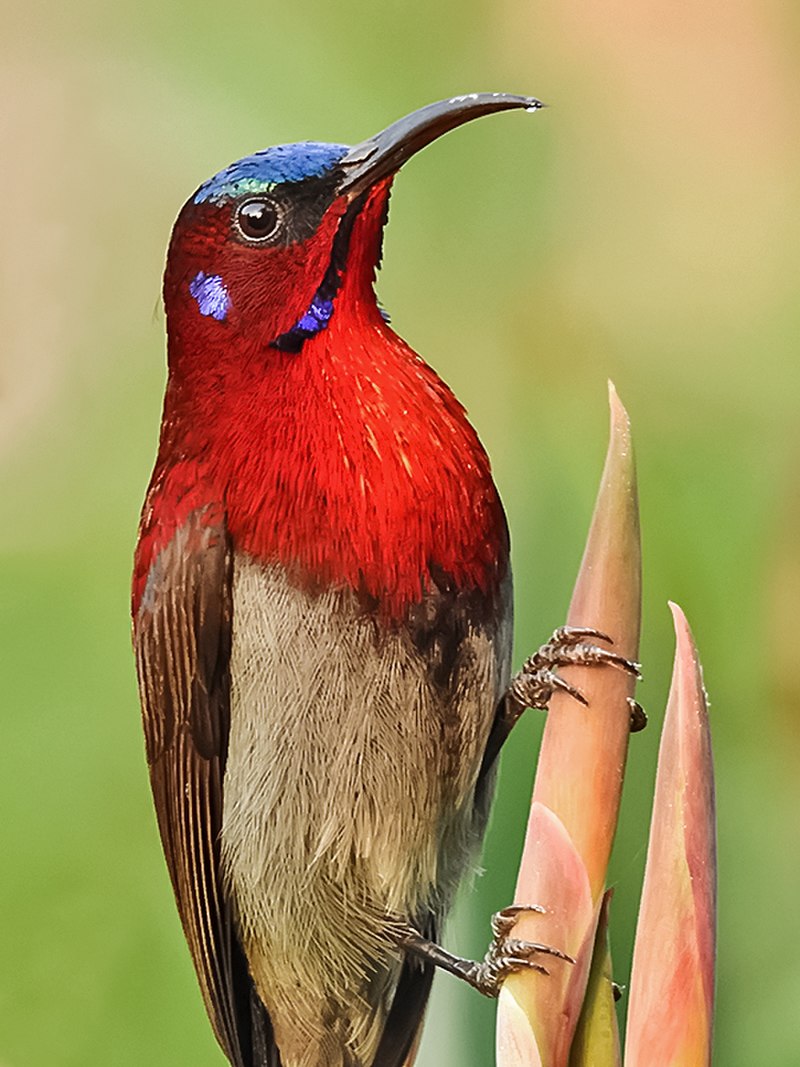
Sunbirds are a family of passerine birds known as the Nectariniidae, found mainly in Africa and parts of Asia. These small, slender birds have downward-curved bills and often feature brightly coloured iridescent feathers.
The males usually display longer tail feathers than females. Sunbird diets consist mostly of nectar from flowers which they sip using their long bill while hovering above them like hummingbirds do.
They also eat insects such as spiders and moths to supplement their nutrition needs.
Sunbirds can be seen flitting around gardens or parks looking for food sources – sometimes alone but more commonly in pairs or families during breeding season when they become quite territorial over an area where they feed on plants with abundant supplies of nectar.
Scientific classification:
| Kingdom | Animalia |
| Phylum | Chordata |
| Class | Aves |
| Order | Passeriformes |
| Superfamily | Passeroidea |
| Family | Nectariniidae Vigors, 1825 |
Also Featured In: African Birds, Large African Birds You Need to Know
7. Yellow-Footed Green Pigeon
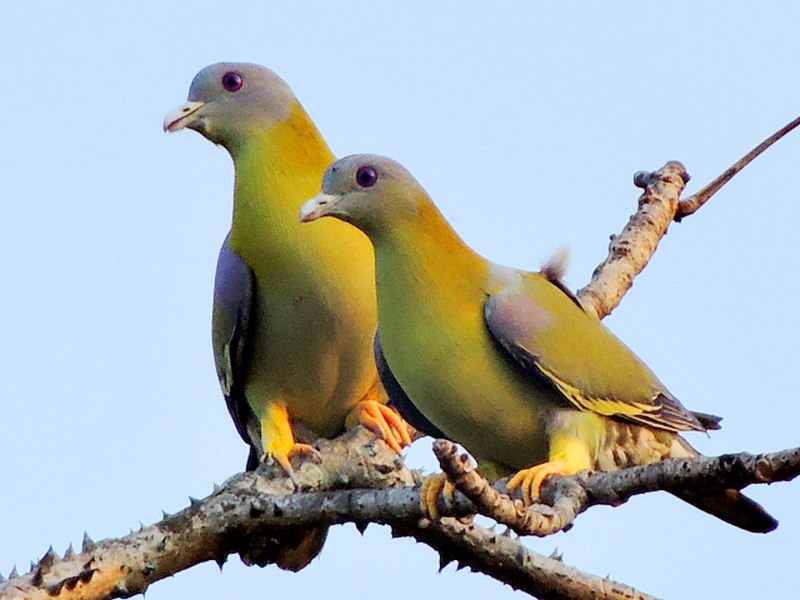
The Yellow-footed Green Pigeon is a common species of green pigeon found in the Indian subcontinent and parts of Southeast Asia. It has yellow feet and legs, with emerald green body plumage that stands out from its surroundings.
This vibrant bird is also the state bird of Maharashtra, where it’s called “Haroli” or “Hariyal”. Its diet consists mainly of fruit like Ficus racemosa, Terminalia arjuna, Syzygium cumini etc., which are important sources for wild animals.
With their impressive vocalizations and adaptability to different environments they have become popular among city dwellers as well.
The Yellow-footed Green Pigeon plays an important role in maintaining healthy ecosystems by providing food to other wildlife while dispersing seeds through defecation – helping propagate new plants across vast areas.
Scientific classification:
| Kingdom | Animalia |
| Phylum | Chordata |
| Class | Aves |
| Order | Columbiformes |
| Family | Columbidae |
| Genus | Treron |
| Species | T. phoenicopterus |
Also Featured In: Birds that Live in Uttar Pradesh, Birds that You’ll Find in Kolkata
8. Indian Grey Hornbill
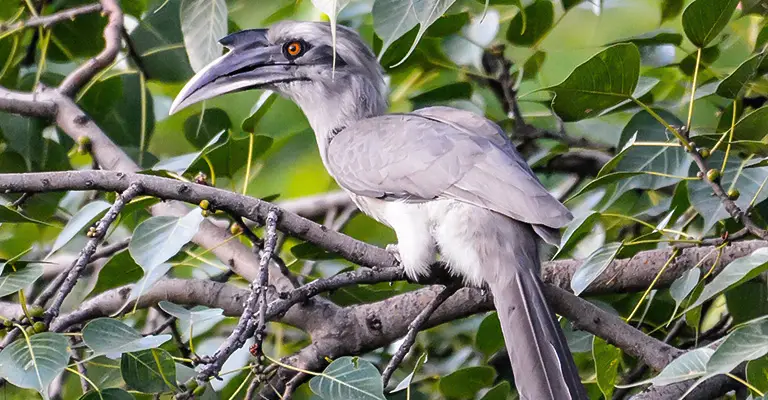
The Indian gray hornbill is a common bird found throughout the Indian subcontinent. It has grey feathers covering its body and a light grey or dull white belly.
Its distinctive feature is an iconic black or darkly-colored horn with a casque extending to the point of curvature on top of it’s head.
They are mostly arboreal, often seen in pairs, and can even be spotted in urban areas across India.
The diet consists mainly of fruit such as figs along with seeds, small reptiles and insects too.
Their loud calls help them communicate over long distances making them easily identifiable within their habitat range
Scientific classification:
| Kingdom | Animalia |
| Phylum | Chordata |
| Class | Aves |
| Order | Bucerotiformes |
| Family | Bucerotidae |
| Genus | Ocyceros |
| Species | O. birostris |
Also Featured In: Native Pakistani Birds,
9. Sind Sparrow
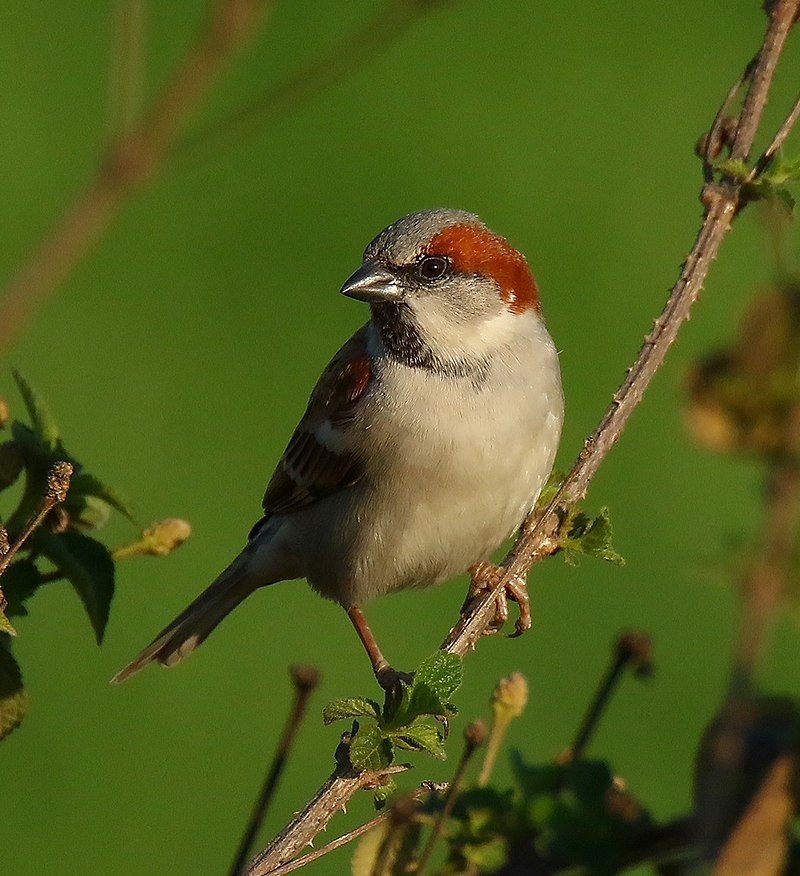
The Sind sparrow is a small passerine bird of the Passeridae family, native to South Asia. It has similar features to the house sparrow but with distinctive plumage differences; males have brighter feathers than females and young birds.
The Sind Sparrow lives in open forests, farmland and rural regions around the Indus Valley region in India, Pakistan and Afghanistan making it an important part of local wildlife.
Its diet consists mainly of vegetation such as grains or seeds along with some insects found on land or water sources like riverside pools.
Conservation efforts are needed for this species due its decreasing population size caused by habitat destruction from human activities such as deforestation and urbanization.
Scientific classification:
| Kingdom | Animalia |
| Phylum | Chordata |
| Class | Aves |
| Order | Passeriformes |
| Family | Passeridae |
| Genus | Passer |
| Species | P. pyrrhonotus |
10. Common Babbler
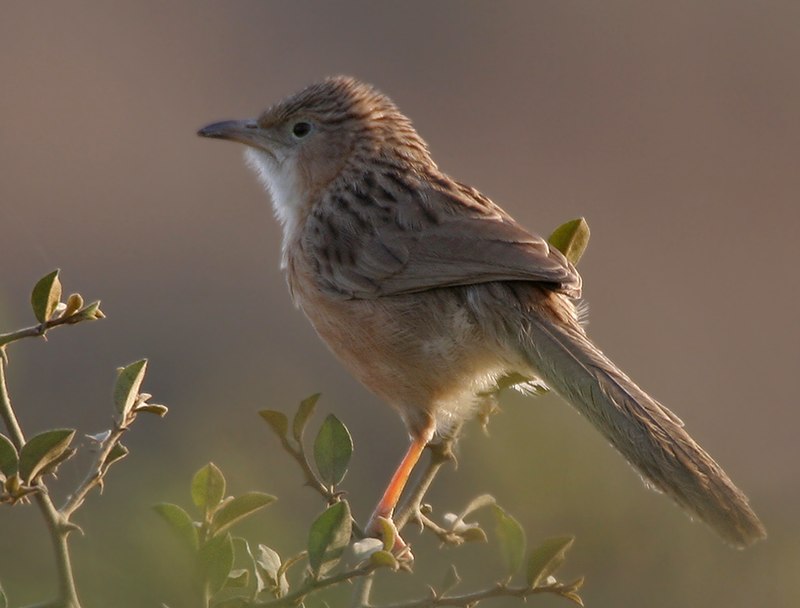
The Common Babbler is a medium-sized, brown bird with an unmistakable long tail. Found mainly in India and parts of Afghanistan, it prefers dry open scrub country near grasslands or cultivation fields.
This unique species has two distinct subspecies; the population to the west of Indus river system are now generally treated as separate species – Afghan Babblers (Turdoides huttoni).
These birds live in pairs or small family groups and can often be seen perched on branches looking for food using their sharp eyesight.
They feed mainly on insects but will sometimes eat berries too.
Despite being relatively common throughout its range this shy creature remains difficult to spot due to its cryptically colored plumage that helps camouflage itself from potential predators.
Scientific classification:
| Kingdom | Animalia |
| Phylum | Chordata |
| Class | Aves |
| Order | Passeriformes |
| Family | Leiothrichidae |
| Genus | Argya |
| Species | A. caudata |
11. Jungle Babbler
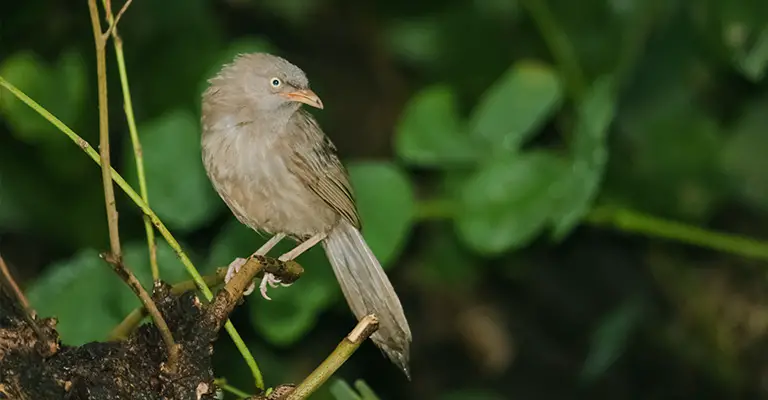
The Jungle Babbler is a member of the Leiothrichidae family, native to India.
It’s known for its gregarious nature and often forms small groups up to 10 birds while they search for food – this habit has earned them the nickname ‘Seven Sisters’ in Northern India, or Saath Bhai (seven brothers) in Bengali.
This colourful bird typically grows around 20 cm long with olive-brown plumage and a black eyestripe running through each eye; it also sports yellowish legs which contrast nicely against their feathers.
The jungle babbler is an omnivore that consumes insects as well as fruits, flowers and nectar from plants.
They are predominantly found near dense forests but may move into shrublands when seasonal changes occur or if there’s a lack of resources available within the forest environment.
With its cheerful call being heard throughout much of Southern Asia, these social birds make great additions to any garden setting.
Scientific classification:
| Kingdom | Animalia |
| Phylum | Chordata |
| Class | Aves |
| Order | Passeriformes |
| Family | Leiothrichidae |
| Genus | Argya |
| Species | A. striata |
12. Coppersmith Barbet
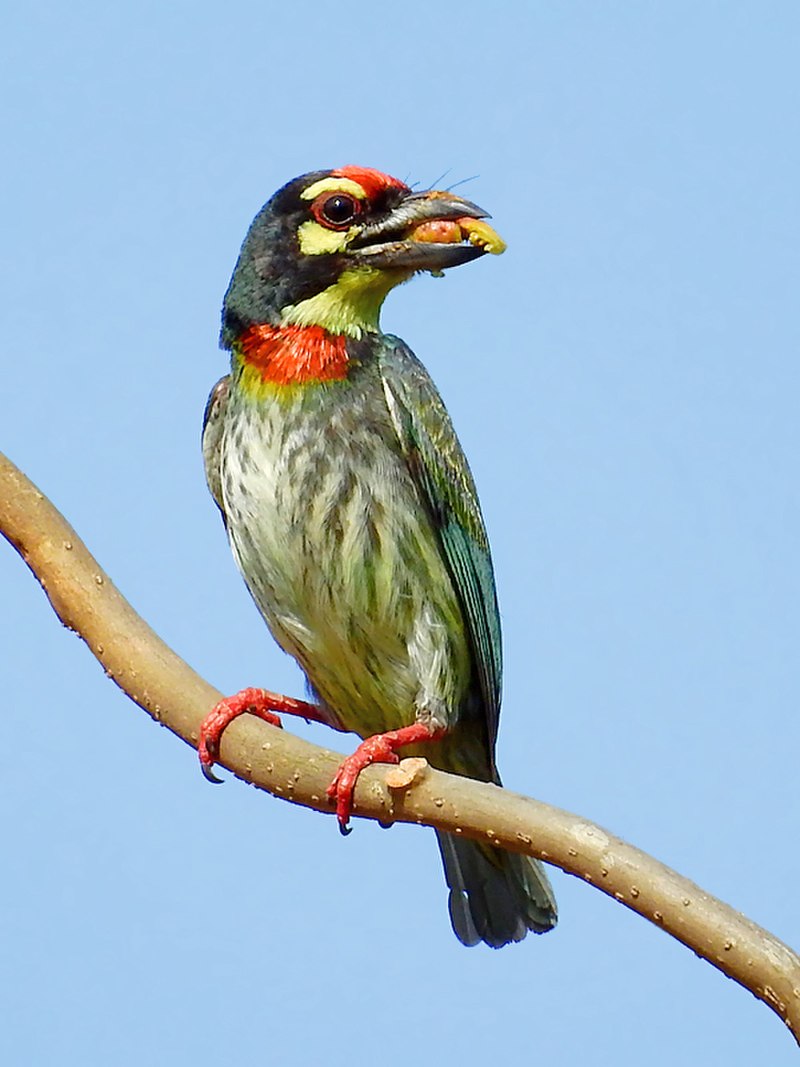
The Coppersmith barbet is an attractive Asian bird, easily recognizable by its bright crimson forehead and throat.
It has a call that sounds like a coppersmith striking metal with a hammer – hence its name.
These birds are found in the Indian subcontinent and parts of Southeast Asia where they build their nests inside trees, carving out holes for themselves.
They can often be seen perched high up on trees or wires during the day as they feed on fruit from nearby branches.
The vibrant colors of these birds make them stand out amongst other species in their habitat.
Scientific classification:
| Kingdom | Animalia |
| Phylum | Chordata |
| Class | Aves |
| Order | Piciformes |
| Family | Megalaimidae |
| Genus | Psilopogon |
| Species | P. haemacephalus |
Also Featured In: Most Common Types of Bangladeshi Birds, Common Birds of Chhattisgarh
13. Black Francolin
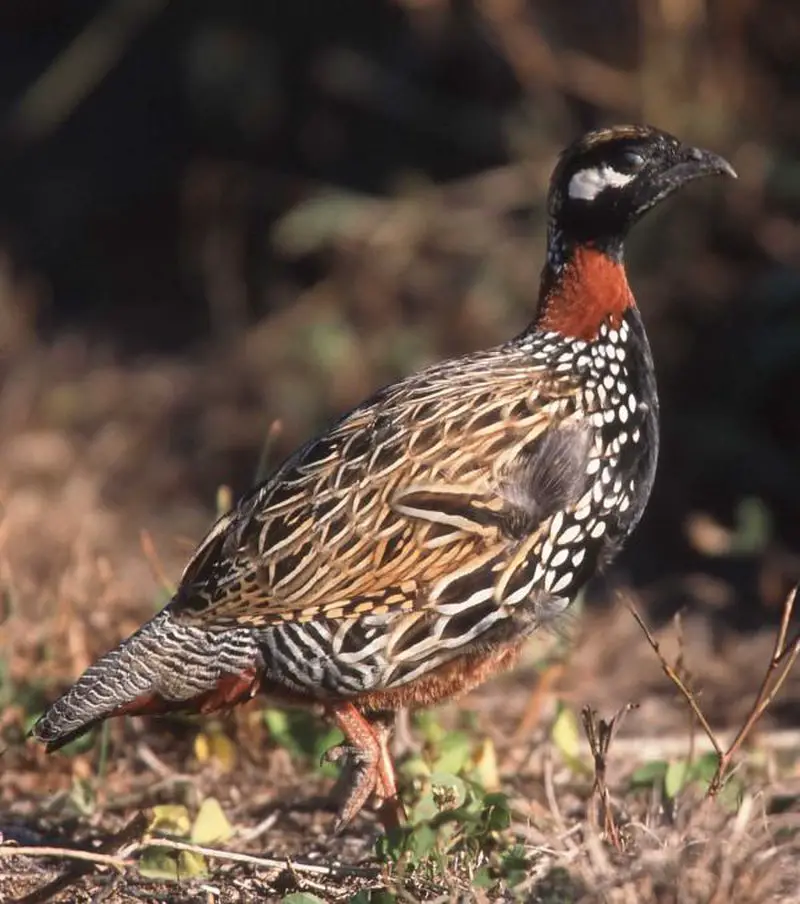
Black francolin is a species of gamebird belonging to the pheasant family. It was once known as black partridge and is now declared as state bird of Haryana, India.
The adult males are generally about 33-36 cm in length with an average weight of 453 gm.
They have glossy black plumage with white spotting on their wings and body parts along with barring patterns on tail feathers which makes them look attractive.
Their call sounds like ‘kattar kattar’ continuously repeated at regular intervals throughout the day during breeding season from April – June when they become highly vocal for mating purpose.
These birds can be found in open grasslands, scrub forests or agricultural fields where plenty of food (mainly insects) is available for survival & reproduction purposes making it one of the most common avifauna across its range countries such as Pakistan, Afghanistan & Nepal etc.
Scientific classification:
| Kingdom | Animalia |
| Phylum | Chordata |
| Class | Aves |
| Order | Galliformes |
| Family | Phasianidae |
| Genus | Francolinus |
| Species | F. francolinus |
Also Featured In: Armenian Birds You Should Know,
14. Black Drongo

The Black Drongo is a small passerine bird of the Dicruridae family, commonly found in tropical southern Asia from Iran through India and Bangladesh to Indonesia.
It has an all black plumage and distinctive forked tail measuring 28 cm long. This omnivorous species feeds on insects such as flies, bees, beetles and moths; it also consumes fruit juices during summer months.
The nest can be built anywhere including open fields or near houses made up of twigs with a cup-shaped inner lining using grasses & hair filled with feathers & cobwebs.
During breeding season they are known to perform aerial acrobatics while chasing away any intruders who come too close to their nests.
Scientific classification:
| Kingdom | Animalia |
| Phylum | Chordata |
| Class | Aves |
| Order | Passeriformes |
| Family | Dicruridae |
| Genus | Dicrurus |
| Species | D. macrocercus |
Also Featured In: Asian Birds, Most Common Taiwan Birds
15. Laughing Dove
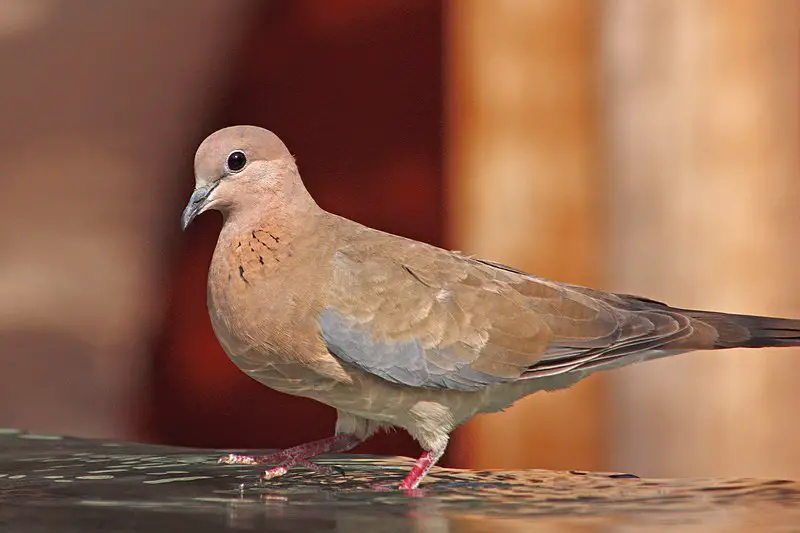
The Laughing Dove is a small and long-tailed pigeon found in dry, scrubby or semi-desert habitats. These birds are native to Africa, the Middle East, South Asia and Western Australia where they were released from Perth Zoo in 1898.
A unique feature of these doves is their call which sounds like low laughter – hence its name.
They form pairs when feeding on the ground, often near water sources such as pools or riverbanks. The diet of this bird consists mainly of seeds with some invertebrates also taking up part of it.
This species has adapted well to different environments due to its ability to find food resources easily even during times when other foods may be scarce.
Scientific classification:
| Kingdom | Animalia |
| Phylum | Chordata |
| Class | Aves |
| Order | Columbiformes |
| Family | Columbidae |
| Genus | Spilopelia |
| Species | S. senegalensis |
Also Featured In: Egyptian Birds, Most Common Western Australia Birds
16. House Crow
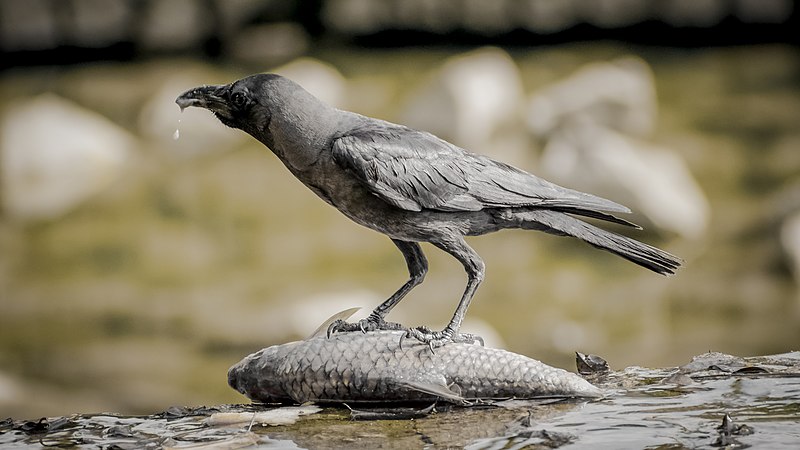
The House Crow (Corvus splendens) is a member of the crow family which originated in Asia and has spread to many other parts of the world.
It is medium-sized, measuring 40 cm long, with a slimmer body than most crows.
The forehead, crown, throat and upper breast are all black while its back and wings are greyish brown.
Its tail feathers have white tips that create an attractive pattern when seen from below during flight. The beak is strong like that of other corvid birds but slightly curved downwards towards its tip.
They can often be found around towns scavenging for food or gathering at roosts near buildings where they congregate to sleep overnight before going out again in search of sustenance.
Scientific classification:
| Kingdom | Animalia |
| Phylum | Chordata |
| Class | Aves |
| Order | Passeriformes |
| Family | Corvidae |
| Genus | Corvus |
| Species | C. splendens |
Also Featured In: Beautiful Malaysian birds,
17. Red-Necked Falcon
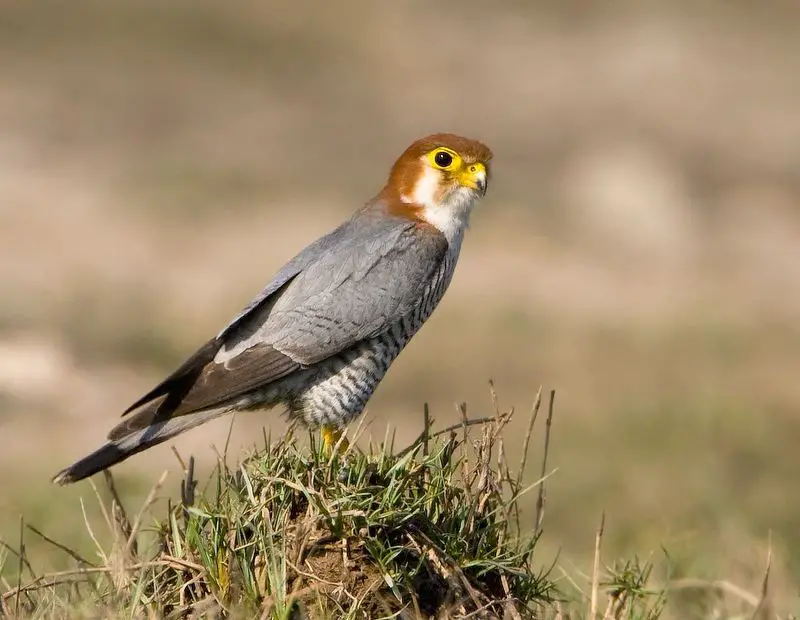
The Red-necked Falcon is a beautiful bird of prey found in two disjunct populations. This medium sized falcon has bluish grey wings and upper body, with the most distinguishing feature being its chestnut red cap which is accompanied by short chin straps that pass through each eye.
The primary feathers are black on its wings along with a single black band at the tip of its tail.
In India it can be seen flying over open country or near forest edges while in Africa they inhabit semi desert areas and savannahs as well as coastal habitats such as lagoons and estuaries.
They hunt during the day mostly for insects like grasshoppers, moths and butterflies but have also been known to take small birds too.
Scientific classification:
| Kingdom | Animalia |
| Phylum | Chordata |
| Class | Aves |
| Order | Falconiformes |
| Family | Falconidae |
| Genus | Falco |
| Species | F. chicquera |
Also Featured In: Falcons Species,
18. Wire-Tailed Swallow
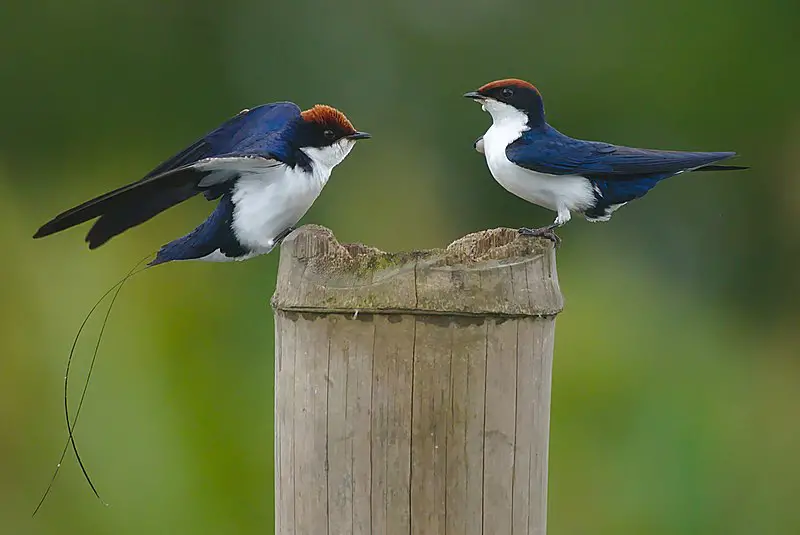
The Wire-tailed Swallow is a small passerine bird from the Hirundo genus and swallow family.
It has two subspecies, one of which can be found in Africa (Hirundo smithii) and the other in Southern and South Eastern Asia (Hirundo filifera).
The species is mainly resident but populations located at Pakistan and Northern India migrate further south during winter season.
These birds are characterized by their brownish back feathers with white spots along with rufous underparts.
Their distinctive feature being long outer tail feathers that extend beyond even their wingspan when seen while they’re flying.
Scientific classification:
| Kingdom | Animalia |
| Phylum | Chordata |
| Class | Aves |
| Order | Passeriformes |
| Family | Hirundinidae |
| Genus | Hirundo |
| Species | H. smithii |
Also Featured In: Swallows Species, Birds that Live in Rajasthan
19. Grey Francolin
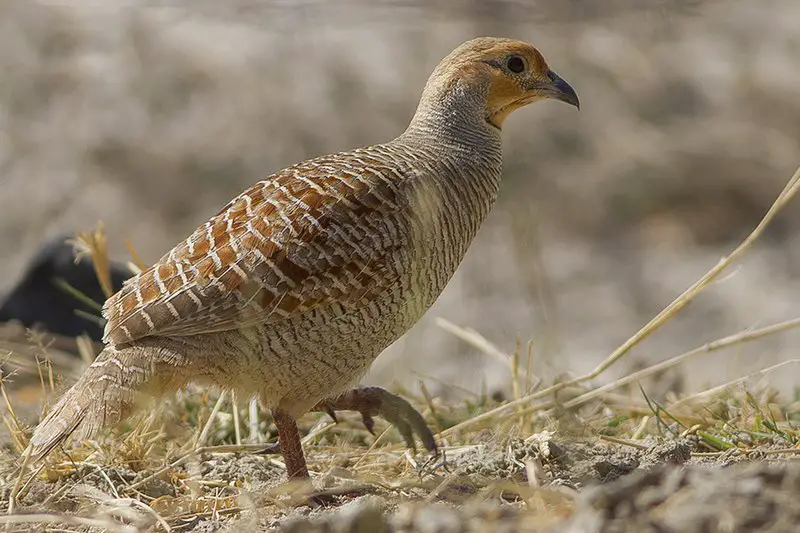
The Grey Francolin is a species of francolin found in the plains and drier parts of India, Iran and some other areas.
It was formerly called the grey partridge but should not be confused with European’s version.
This bird usually lives on ground where it finds open cultivated land. It has also been referred to as “manu moa” or “chicken bird”.
The colours can range from brownish-grey to dark grey along its body while there are black markings near its forehead area.
Its diet typically consists of seeds, leaves, insects and sometimes fruits too which they search for around bushes or tall grasses during early morning hours when these birds are most active.
Scientific classification:
| Kingdom | Animalia |
| Phylum | Chordata |
| Class | Aves |
| Order | Galliformes |
| Family | Phasianidae |
| Genus | Ortygornis |
| Species | O. pondicerianus |
Also Featured In: Hawaii Birds, Hawaii Big Island Birds You Should Know
20. Shikra
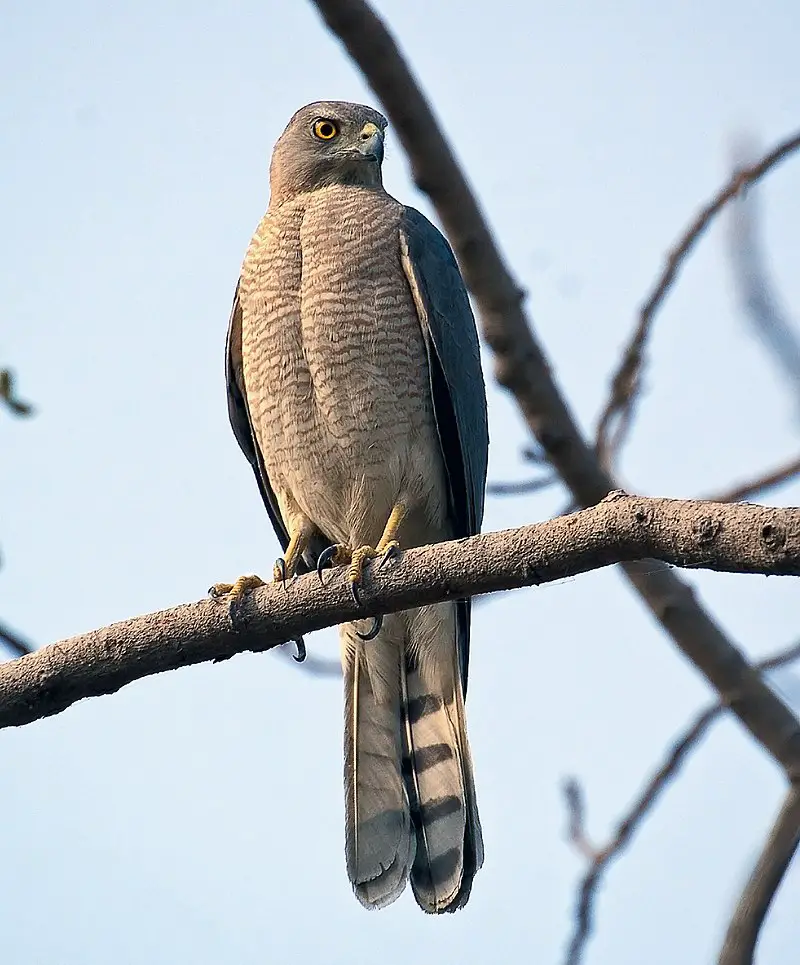
The Shikra bird, also known as the little banded goshawk, is a widespread bird of prey found in Asia and Africa. It is a small species belonging to the Accipitridae family.
The African variations of the Shikra may potentially represent a distinct species, but they are usually considered subspecies.
This bird has physical similarities to other sparrowhawk species, such as the Chinese Goshawk and Eurasian Sparrowhawk.
The Shikra is a quick predator and possesses excellent hunting skills. It typically preys on small mammals, reptiles, and birds.
The bird is known for its distinctive hunting technique, which involves a sudden dash and a quick silent strike to capture its victim.
Its plumage consists of brown or greyish-brown feathers with white and fine black streaks.
Overall, the Shikra bird is an impressive bird of prey, known for its versatility and hunting prowess.
Scientific classification:
| Kingdom | Animalia |
| Phylum | Chordata |
| Class | Aves |
| Order | Accipitriformes |
| Family | Accipitridae |
| Genus | Accipiter |
| Species | A. badius |
Also Featured In: Birds That Live in the Jungle, Native Birds of Kazakhstan
21. Alexandrine Parakeet
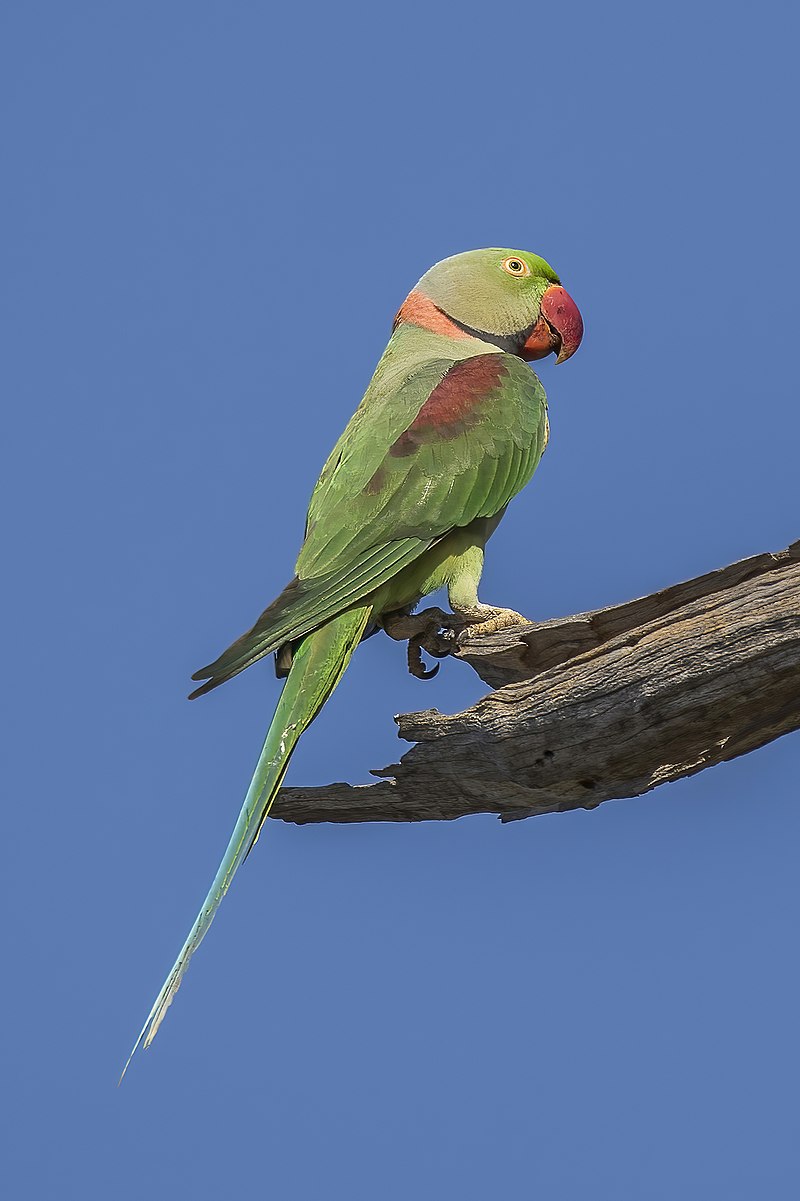
The Alexandrine parakeet is a medium-sized parrot belonging to the Psittacula genus. It is named after Alexander the Great.
Alexander transported many of these parakeets from Punjab to various countries in Europe and the Mediterranean, where they were highly valued by royalty, nobility, and warlords.
They are also known as Alexandrine parrots.
Scientific classification:
| Kingdom | Animalia |
| Phylum | Chordata |
| Class | Aves |
| Order | Psittaciformes |
| Family | Psittaculidae |
| Genus | Psittacula |
| Species | P. eupatria |
Also Featured In: Common Birds of Mumbai, Birds That You’ll See in Kaziranga National Park
22. Brown-Headed Barbet
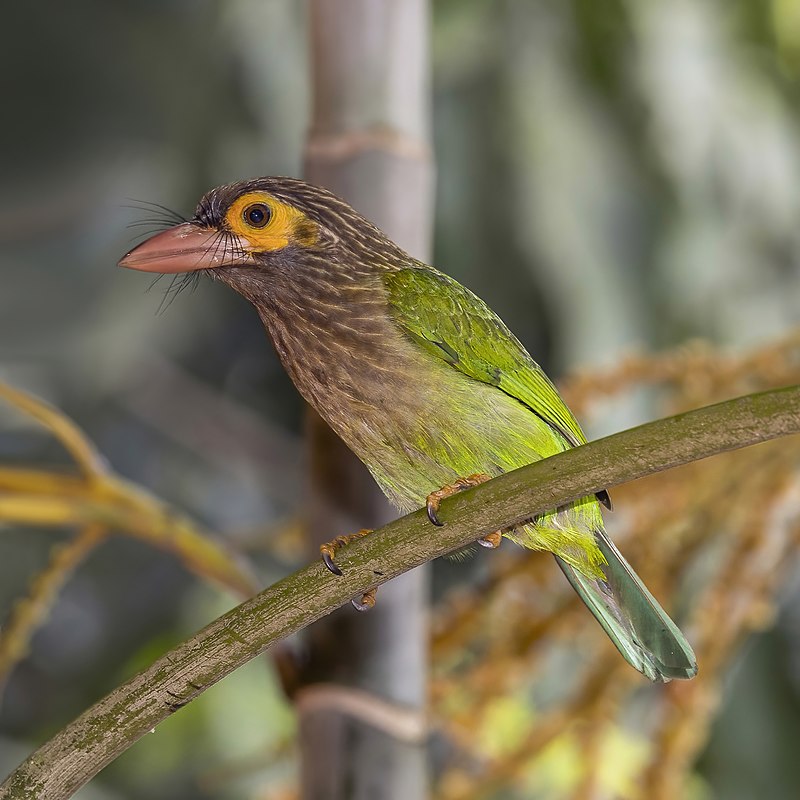
The Brown-headed barbet is an Asian bird that lives in the moist broadleaf forests of the Indian subcontinent. Johann Friedrich Gmelin described it in 1788 as part of the puffbird family.
The Brown-headed barbet has a distinct brown head and a green body. They are known for their distinctive calls, which can be heard echoing through the forests.
These birds feed on insects and fruits, using their strong beaks to break open nuts and seeds.
They are cavity nesters, making their homes in holes in trees. The Brown-headed barbet is considered a species of least concern, although its habitats are threatened by deforestation and human activities.
Their colorful appearance and unique calls make them a delight for birdwatchers to spot in the wild.
Scientific classification:
| Kingdom | Animalia |
| Phylum | Chordata |
| Class | Aves |
| Order | Piciformes |
| Family | Megalaimidae |
| Genus | Psilopogon |
| Species | P. zeylanicus |
Also Featured In: Birds of Goa, Common Birds that Live in Odisha
23. Yellow-Eyed Babbler
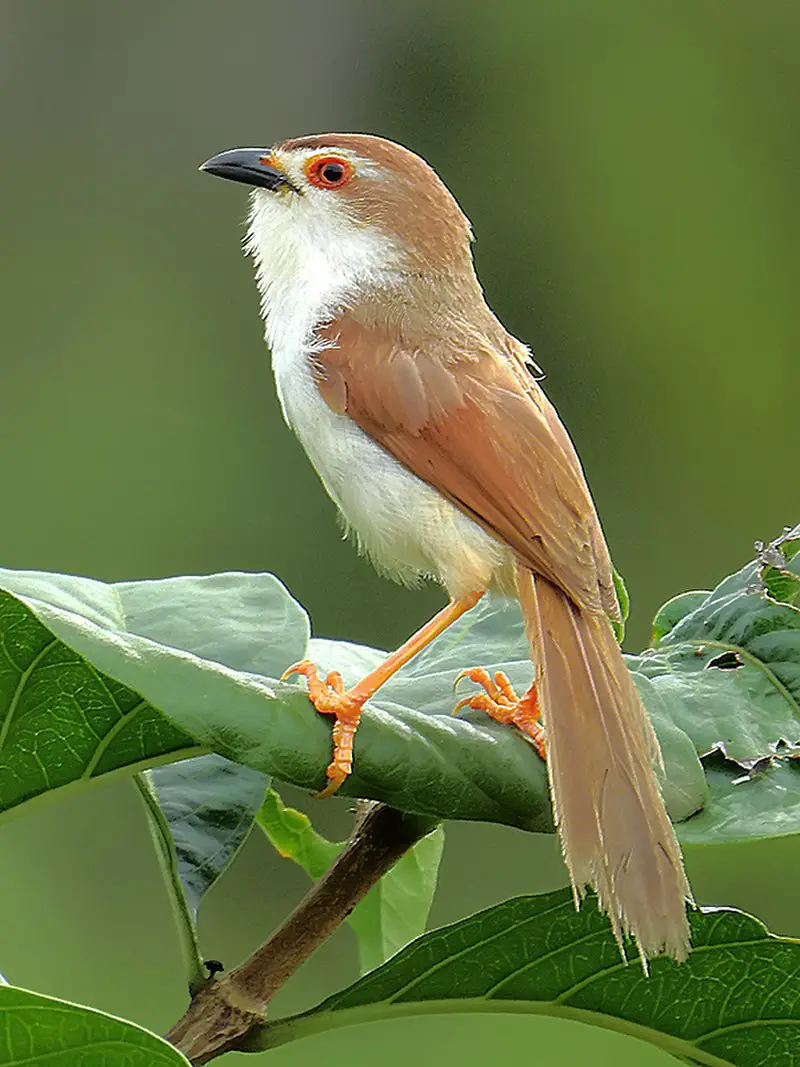
The yellow-eyed babbler is a passerine bird found in South and Southeast Asia. It typically lives in shrubland, grassland, and wetland habitats.
Despite being listed on the IUCN Red List as Least Concern, it is a cherished bird among birdwatchers.
It is known for its distinctive yellow eyes which have earned it its name. Yellow-eyed babblers are part of the Old World babbler family, and their stable population is attributed to their wide distribution.
Overall, the yellow-eyed babbler is a fascinating bird species that can teach us a lot about bird behavior and ecology.
Scientific classification:
| Kingdom | Animalia |
| Phylum | Chordata |
| Class | Aves |
| Order | Passeriformes |
| Family | Paradoxornithidae |
| Genus | Chrysomma |
| Species | C. sinense |
Also Featured In: Gujarati Birds, Common Birds in Bangalore
24. Woolly-Necked Stork
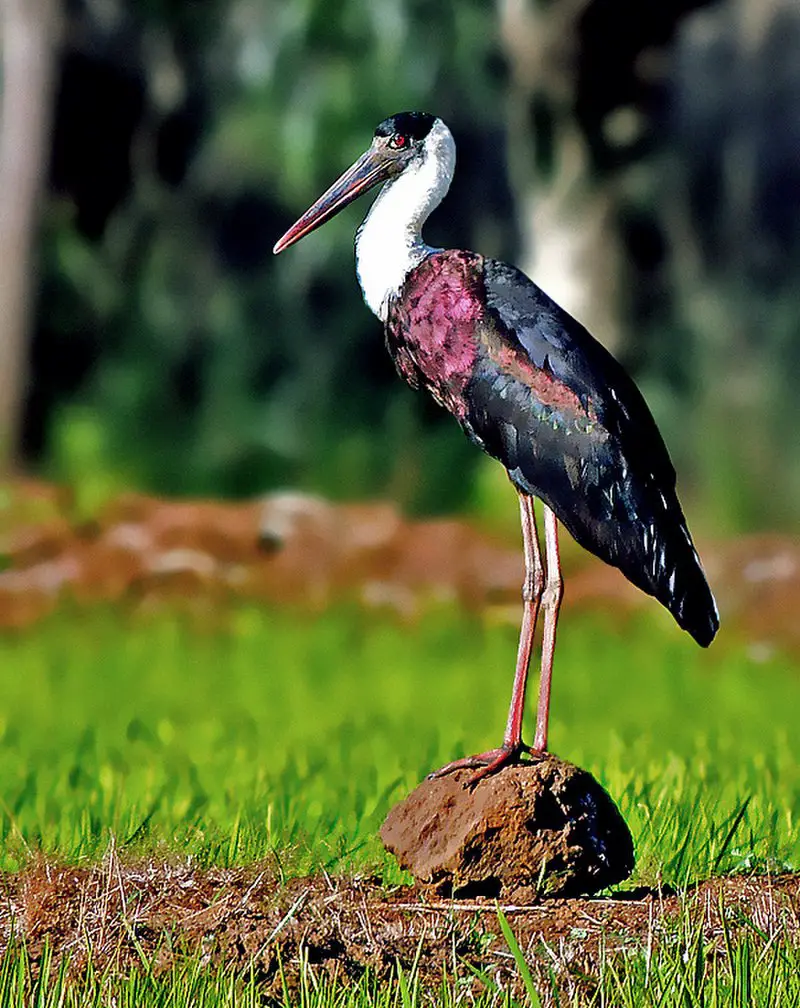
The woolly-necked stork, also known as the Asian woollyneck, belongs to the stork family and is a large wading bird.
It can be found in various habitats including forests, wetlands, and agricultural areas throughout Asia.
This bird typically breeds alone or in small groups. It is known for its long and beautiful feathers that appear woolly in texture around its neck.
The woolly-necked stork was first described by Georges-Louis Leclerc, a French polymath.
It is an important species for its role in maintaining the ecological balance within its habitat.
While their numbers may vary across different regions, these unique birds have come to be appreciated and admired by many.
Scientific classification:
| Kingdom | Animalia |
| Phylum | Chordata |
| Class | Aves |
| Order | Ciconiiformes |
| Family | Ciconiidae |
| Genus | Ciconia |
| Species | C. episcopus |
Also Featured In: Birds that Commonly Found in Bali, Birds of Karnataka
25. Large Grey Babbler
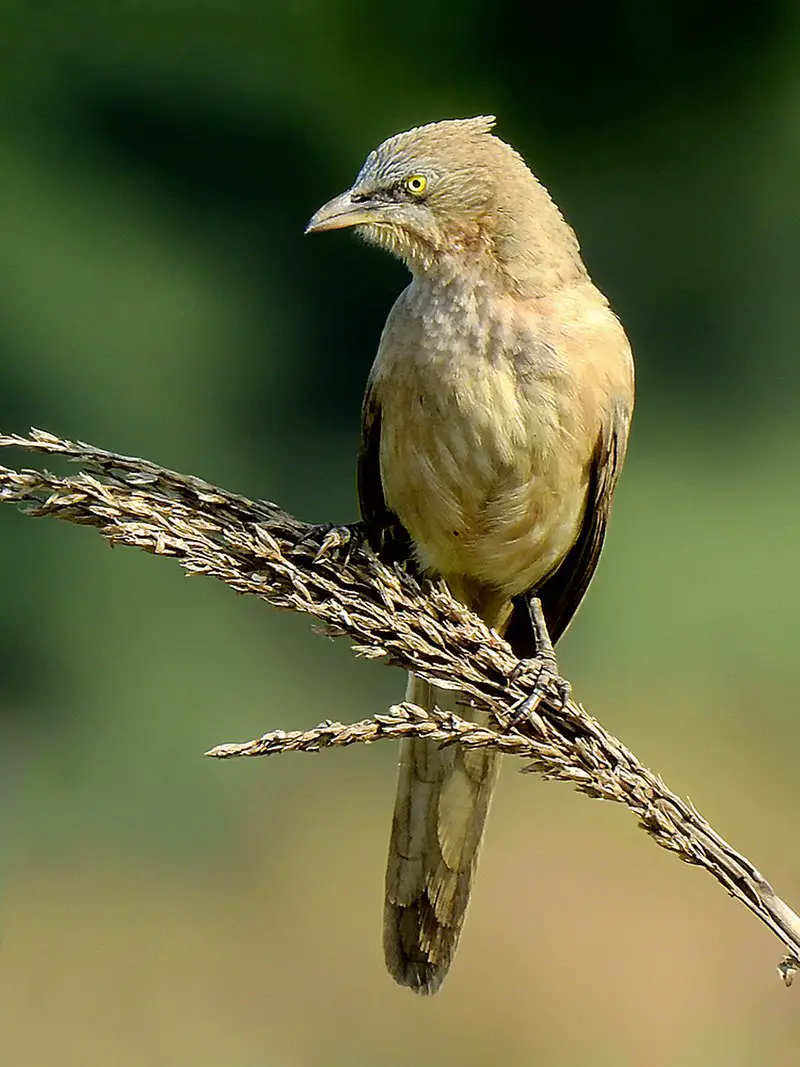
The Large grey babbler is a prominent member of the Leiothrichidae family found across India and western Nepal. They inhabit scrub, open forest, and garden areas and are commonly seen in small groups.
These birds are easily distinguishable from other babblers in the region due to their unique nasal call and whitish outer feathers on their long tails. Additionally, this babbler is one of the largest in the family.
Scientific classification:
| Kingdom | Animalia |
| Phylum | Chordata |
| Class | Aves |
| Order | Passeriformes |
| Family | Leiothrichidae |
| Genus | Argya |
| Species | A. malcolmi |
26. Plum-Headed Parakeet
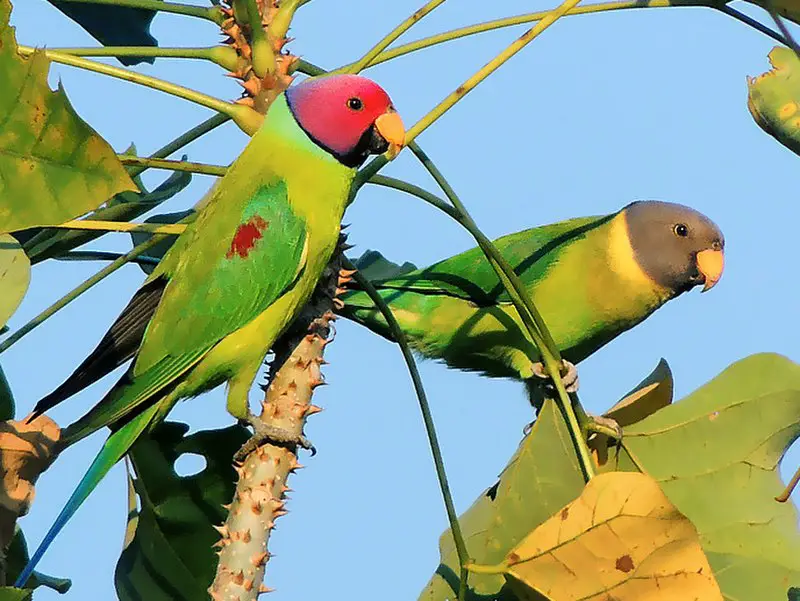
The Plum-headed parakeet is a bird in the Psittacidae family, endemic to the Indian Subcontinent. It was once considered the same species as the blossom-headed parakeet, but has been recognized as a distinct species.
Males have a pinkish-purple head, while females have a grey head. They fly swiftly in flocks, and are known for their vibrant colors.
Their diet typically consists of fruits, flowers and seeds. These birds are popular among bird enthusiasts for their beauty and entertaining personalities.
They are also considered a pest by some farmers, as they can cause damage to crops.
Despite this, the Plum-headed parakeet remains a much-loved bird in the Indian subcontinent, and is considered a symbol of love and romance in some cultures.
Scientific classification:
| Kingdom | Animalia |
| Phylum | Chordata |
| Class | Aves |
| Order | Psittaciformes |
| Family | Psittaculidae |
| Genus | Psittacula |
| Species | P. cyanocephala |
Also Featured In: Pet Birds that Live in India,
27. White-Browed Wagtail
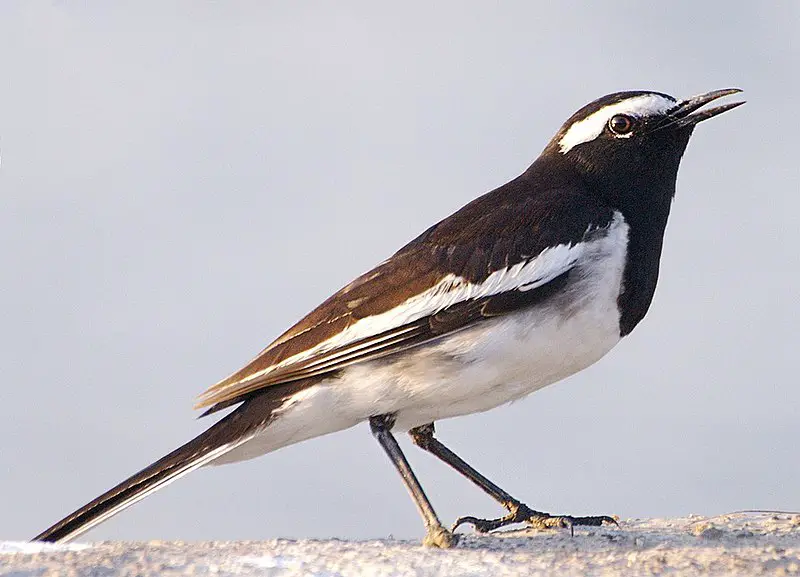
The White-browed wagtail, also known as the large pied wagtail or Motacilla maderaspatensis, is a medium-sized bird belonging to the wagtail family.
This bird boasts a striking black and white pattern, with black feathers above and white feathers below.
It also features a white brow, shoulder stripe, and outer tail feathers. The White-browed wagtail can be commonly found near small bodies of water in South Asia and has adapted well to living in urban environments.
As the largest member of its family, this bird is a magnificent sight to behold, often spotted flitting about rapidly by the water’s edge.
Scientific classification:
| Kingdom | Animalia |
| Phylum | Chordata |
| Class | Aves |
| Order | Passeriformes |
| Family | Motacillidae |
| Genus | Motacilla |
| Species | M. maderaspatensis |
Also Featured In: Black And White Birds You Don’t Know About,
28. Streak-Throated Swallow
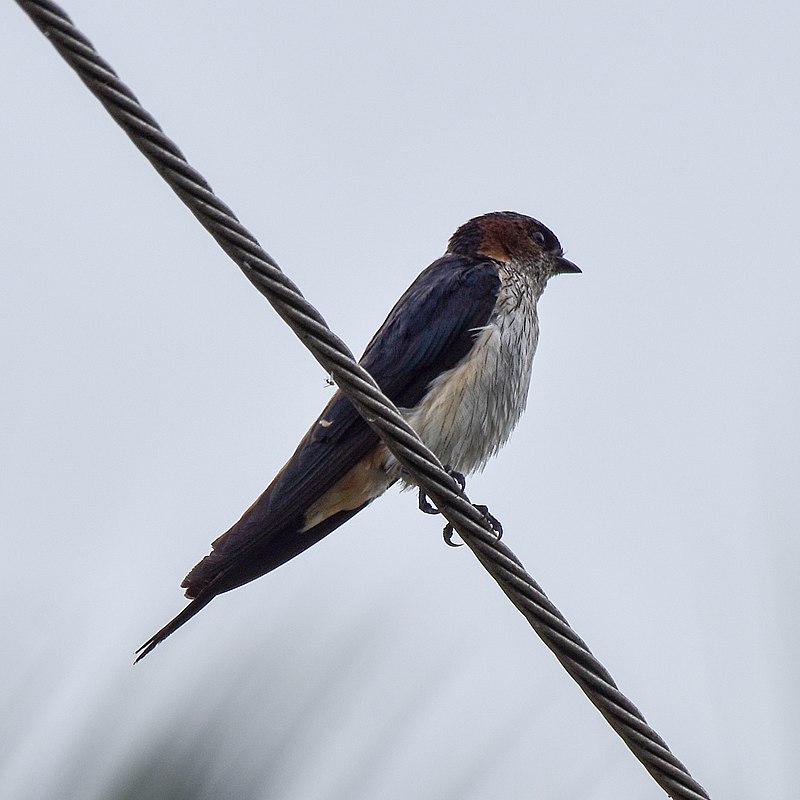
The streak-throated swallow, also known as the Indian cliff swallow, is a bird species that belongs to the passerine family.
It is primarily found in South Asia and can be seen in countries like Afghanistan, India, Nepal, and Pakistan.
This bird species can be a breeder, a year-round resident, or a winter visitor in these regions.
Additionally, streak-throated swallows may also appear as a vagrant in the Maldives, Sri Lanka, and the Middle East.
This bird species is part of a bigger family of swallows and has unique streaks on its throat.
Due to its presence in multiple countries, the streak-throated swallow is an important part of the ecosystem in South Asia.
Scientific classification:
| Kingdom | Animalia |
| Phylum | Chordata |
| Class | Aves |
| Order | Passeriformes |
| Family | Hirundinidae |
| Genus | Petrochelidon |
| Species | P. luvicola |
29. Common Woodshrike
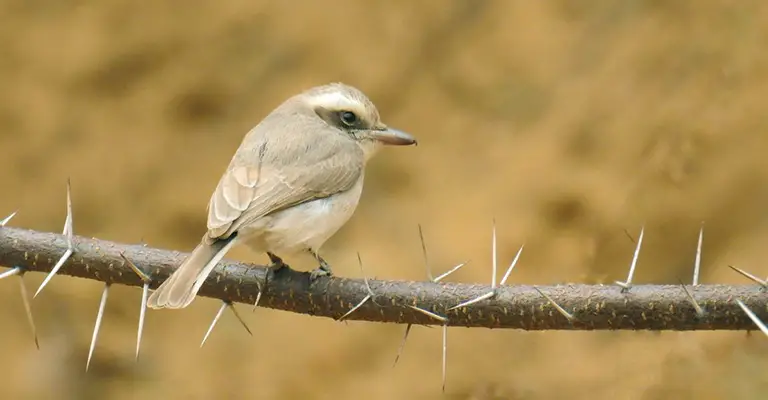
The Common woodshrike bird is a small, ashy brown species found across Asia. It has a distinctive dark cheek patch and broad white brow.
Normally found in thin forests and scrub habitats, they are known to hunt insects as their primary diet, occasionally joining other insectivorous birds.
Native to Sri Lanka, they were previously classified under the family Vangidae. Despite their small size, they have striking features that make them stand out.
The Common woodshrike bird is a unique and intriguing species that deserves our attention and appreciation.
Scientific classification:
| Kingdom | Animalia |
| Phylum | Chordata |
| Class | Aves |
| Order | Passeriformes |
| Family | Vangidae |
| Genus | Tephrodornis |
| Species | T. pondicerianus |
Also Featured In: Birds that Live in Tamil Nadu, Endemic Sri Lanka Birds
30. Grey-Breasted Prinia
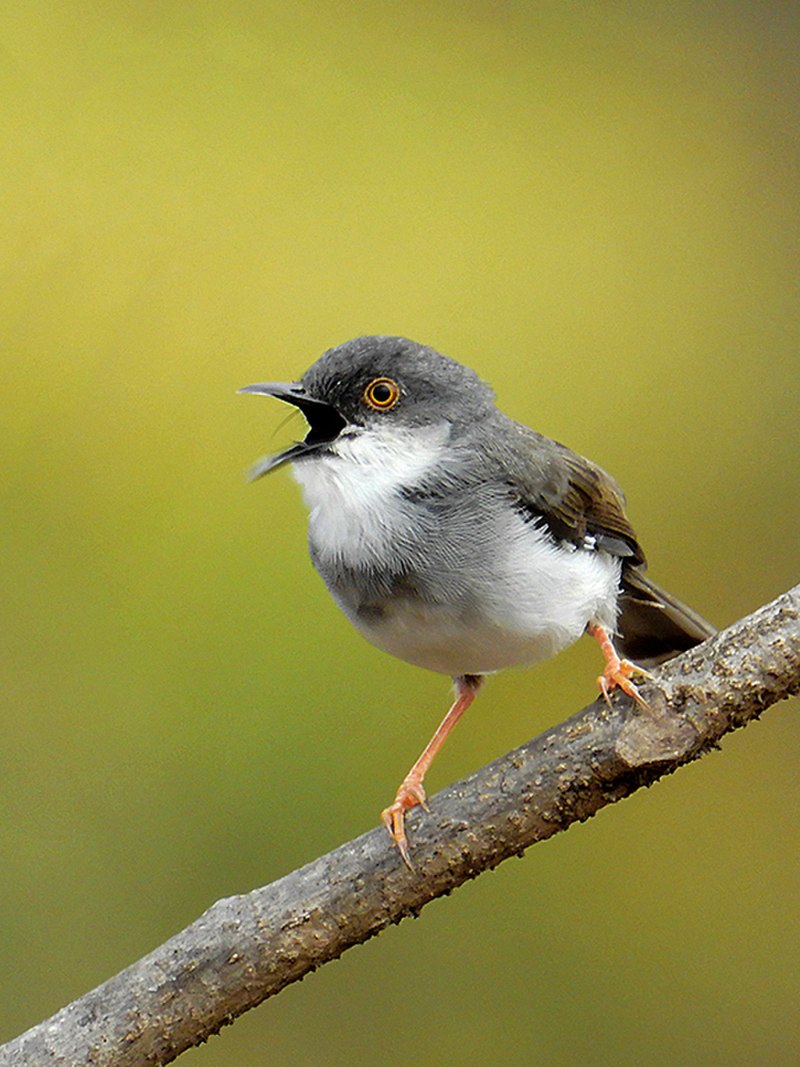
The Grey-breasted prinia, also known as Franklin’s prinia, is a small passerine bird found mainly in southern regions of the Old World. It is a resident breeder in the Indian subcontinent, Sri Lanka, and southeast Asia.
This bird is easily distinguished from other prinias by the smoky grey band across its breast. It often holds its tail upright while perched.
The grey-breasted prinia belongs to the wren-warbler family and is known for its distinctive vocalizations.
It is a common sight in grasslands and scrub forests, where it feeds on insects and spiders. This bird’s breeding season varies depending on the region it inhabits.
Its nests are built on the ground, and the female lays 2-4 eggs in each clutch. The grey-breasted prinia is considered a species of least concern by the IUCN.
Scientific classification:
| Kingdom | Animalia |
| Phylum | Chordata |
| Class | Aves |
| Order | Passeriformes |
| Family | Cisticolidae |
| Genus | Prinia |
| Species | P. hodgsonii |
31. Long-Tailed Minivet
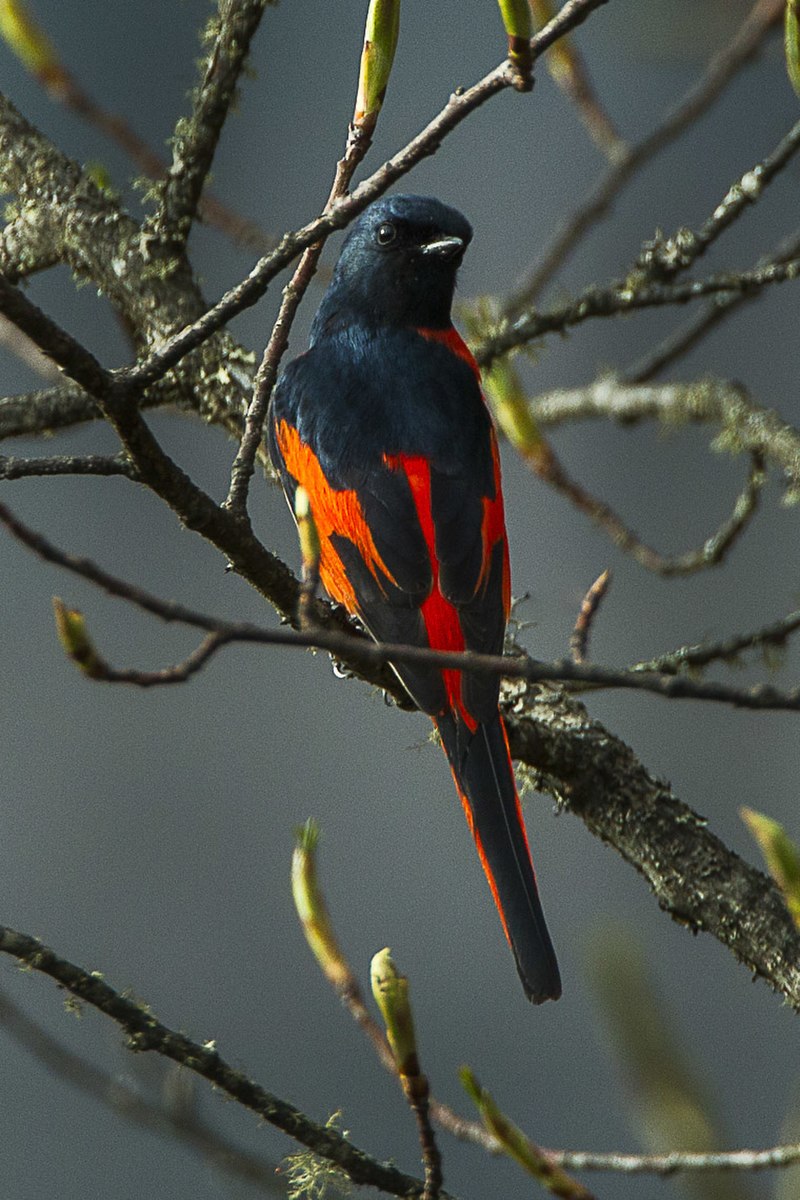
The Long-tailed Minivet is a colorful bird that can be found in southern and southeast Asia. Its striking plumage is a mix of black, white, and fiery orange-red hues, making it easy to spot in its natural habitats of moist lowland and montane forests.
This bird can be found in countries like Afghanistan, Bangladesh, and Vietnam, among others.
The Long-tailed Minivet belongs to the family Campephagidae and has an elongated tail, which is a prominent feature that gives it its name. Its diet mainly consists of insects, which it catches while in flight.
The males have more vibrant plumage compared to the females, and they are known to be vocal birds that make loud, melodious calls.
These birds are fascinating to observe in the wild and are a delight to many bird-watchers around the world.
Scientific classification:
| Kingdom | Animalia |
| Phylum | Chordata |
| Class | Aves |
| Order | Passeriformes |
| Family | Campephagidae |
| Genus | Pericrocotus |
| Species | P. ethologus |
Also Featured In: Birds that Live in Uttarakhand, Birds that Commonly Found in Andhra Pradesh